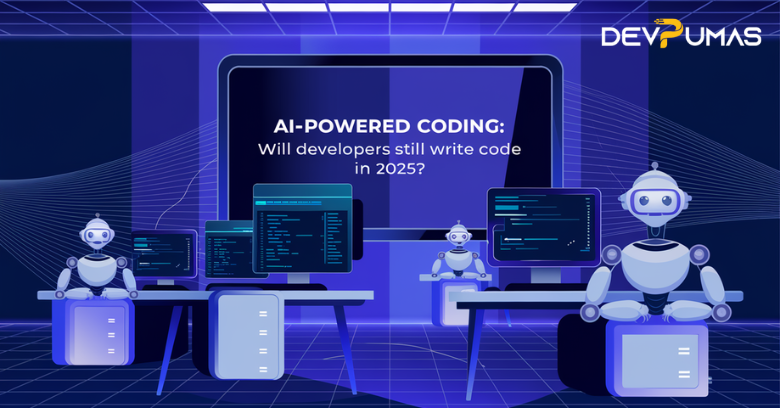Introduction: The Rise of AI-Powered Coding
The software development landscape is undergoing a seismic shift with the emergence of AI-powered coding tools. Technologies like GitHub Copilot and ChatGPT are changing how developers approach coding, offering automated solutions, code suggestions, and debugging support. This evolution raises an important question: will developers still write code in 2025, or will AI dominate the development process entirely? AI-powered coding is not just a trend but a transformative force that’s reshaping the future of programming.
This article delves into the role of AI in coding, examining its current applications, potential future impact, and the balance between human and AI collaboration.
The Current State of AI in Software Development
Tools Revolutionizing Coding
Several AI-powered coding tools have already become indispensable to developers:
- GitHub Copilot: Powered by OpenAI’s Codex, Copilot provides real-time code suggestions directly within IDEs, helping developers write code faster.
- ChatGPT: Known for its conversational capabilities, it assists with debugging, generating code snippets, and explaining complex programming concepts.
- Tabnine: Offers AI-driven code completions based on deep learning models, enhancing productivity.
These tools don’t just automate repetitive tasks; they also elevate the coding experience by offering smart suggestions and simplifying complex workflows.
AI’s Impact on Developer Productivity
Faster Development Cycles
AI-powered coding accelerates development cycles by:
- Automating repetitive tasks such as code formatting and boilerplate generation.
- Reducing debugging time with advanced error detection and fixes.
- Streamlining testing processes through AI-driven unit test generation.
Developers can focus on strategic problem-solving rather than mundane tasks, making AI a powerful ally in increasing productivity.
Enhanced Collaboration
AI tools are becoming collaborative partners in pair programming. GitHub Copilot, for example, acts as a “coding assistant,” suggesting improvements and helping developers write cleaner, more efficient code.
Democratizing Coding
AI-powered coding tools are lowering barriers to entry for beginners. By generating boilerplate code and providing step-by-step guidance, these tools make it easier for novice developers to create functional applications without extensive programming knowledge.
Will AI Replace Developers?
While AI-powered coding tools are impressive, the idea that AI will completely replace developers is a misconception. Here’s why:
Contextual Understanding
Human developers excel at understanding the broader context of projects, which AI still struggles to grasp. Complex decision-making and creative problem-solving require human input.
Ethical Considerations
Developers play a critical role in ensuring ethical AI deployment. They write code that aligns with organizational values and legal requirements, tasks that AI cannot perform autonomously.
Innovation and Creativity
AI tools can generate code, but they cannot innovate or create original ideas. Developers will always be needed to drive innovation and push boundaries in technology.
The Future of AI-Powered Coding
Trends to Watch in AI Development Tools
- Natural Language Coding: AI will make it possible to write code using natural language instructions, bridging the gap between technical and non-technical users.
- Context-Aware AI: Future AI models will better understand project requirements, enabling them to offer more relevant suggestions.
- Full-Stack Integration: AI-powered coding tools will expand to cover the entire development stack, from front-end to back-end and DevOps.
Hybrid Workflows
The future lies in hybrid workflows where AI and developers work together. Developers will guide AI models, ensuring their outputs align with project goals, while AI handles repetitive and time-consuming tasks.
Challenges of AI-Powered Coding
Code Quality and Security
AI-generated code is not always perfect. Developers must carefully review AI-generated code for:
- Bugs and errors
- Security vulnerabilities
- Compliance with coding standards
Dependence on AI
Over-reliance on AI tools could lead to a decline in developer skills. Balancing AI usage with manual coding is essential to maintain technical proficiency.
Ethical Concerns
AI-powered coding raises ethical questions, such as:
- Data privacy: How are training datasets sourced?
- Bias: Are AI models biased toward certain coding practices or languages?
Examples of AI-Powered Coding in Action
AI in Web Development
AI tools are helping developers create responsive and accessible web applications with minimal effort. For instance, Copilot can auto-generate HTML, CSS, and JavaScript for dynamic web pages.
AI in Data Science
ChatGPT and similar tools assist data scientists by:
- Writing Python scripts for data analysis.
- Automating visualization creation.
- Debugging machine learning models.
AI in Game Development
Game developers use AI tools for procedural content generation, scripting, and real-time debugging, accelerating the game development process.
How Developers Can Adapt to AI-Powered Coding
Upskilling and Continuous Learning
To thrive in an AI-powered future, developers should focus on:
- Mastering AI tools: Learn how to use tools like Copilot effectively.
- Improving problem-solving skills: Focus on high-level problem-solving and architecture design.
- Learning multiple programming languages: Stay versatile by mastering languages that AI tools support.
Embracing Collaboration
Developers should view AI tools as collaborators rather than competitors. By leveraging AI’s strengths, developers can enhance their workflows and deliver better results.
Staying Ethical
Understanding the ethical implications of AI in coding is crucial. Developers must ensure their projects adhere to legal standards and ethical guidelines.
Famous AI Tools for Coding
Here are some well-known AI tools transforming software development:
- GitHub Copilot: Offers smart code suggestions and assists in pair programming.
- ChatGPT: Analyzes and debugs code while offering explanations in natural language.
- Tabnine: Provides AI-driven code completions for various languages.
- Replit Ghostwriter: A coding assistant designed for collaborative programming.
These tools highlight the growing ecosystem of AI-powered coding solutions
Wrapping It Up: The Role of Developers in 2025
AI-powered coding is undeniably reshaping the software development landscape. By 2025, developers won’t be replaced but rather empowered by AI tools. These tools will handle repetitive tasks, leaving developers free to focus on innovation, creativity, and strategic problem-solving.
The future of coding lies in collaboration between human developers and AI-powered assistants. By embracing this hybrid approach, the development community can unlock new levels of productivity and innovation.



